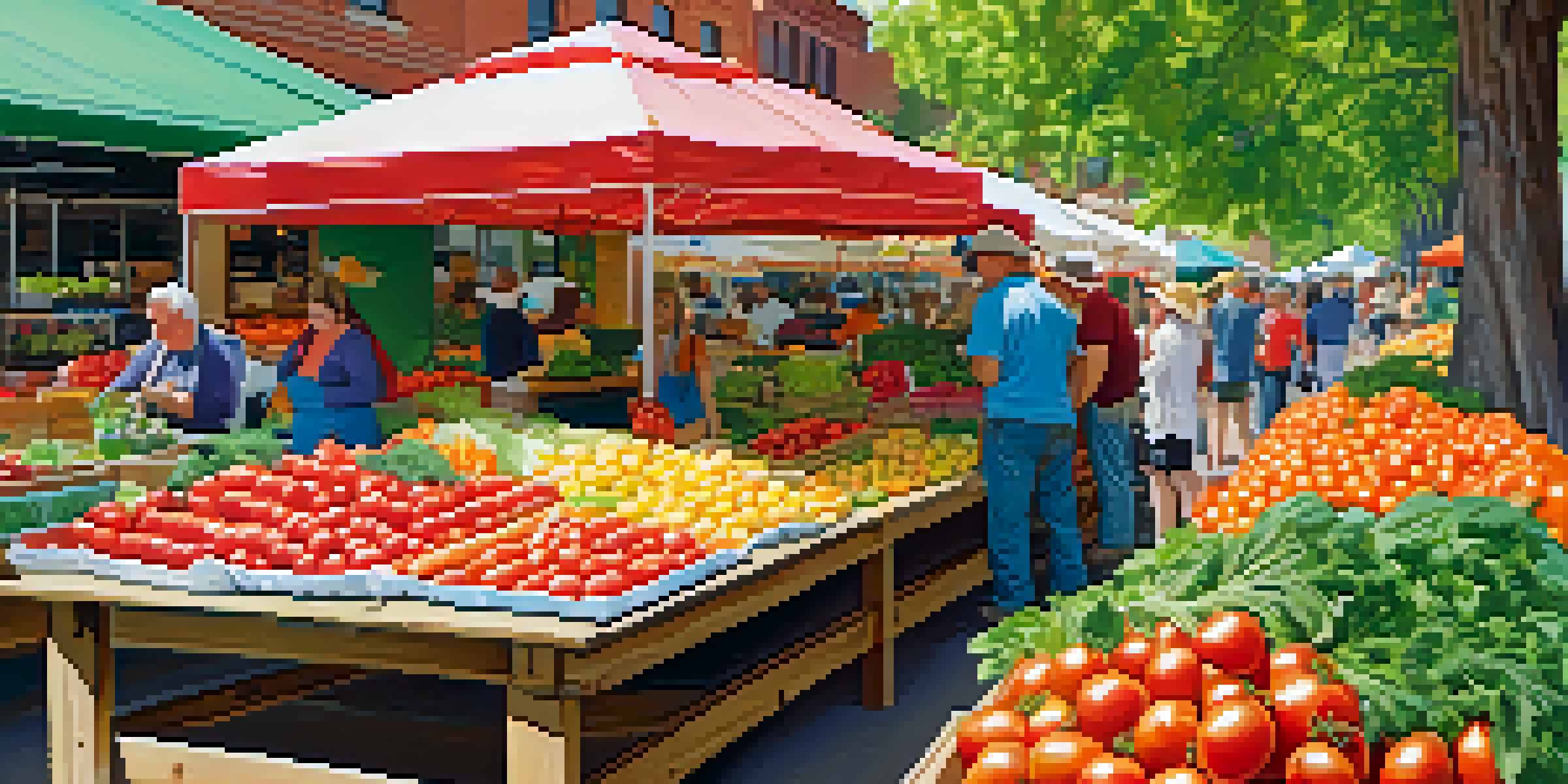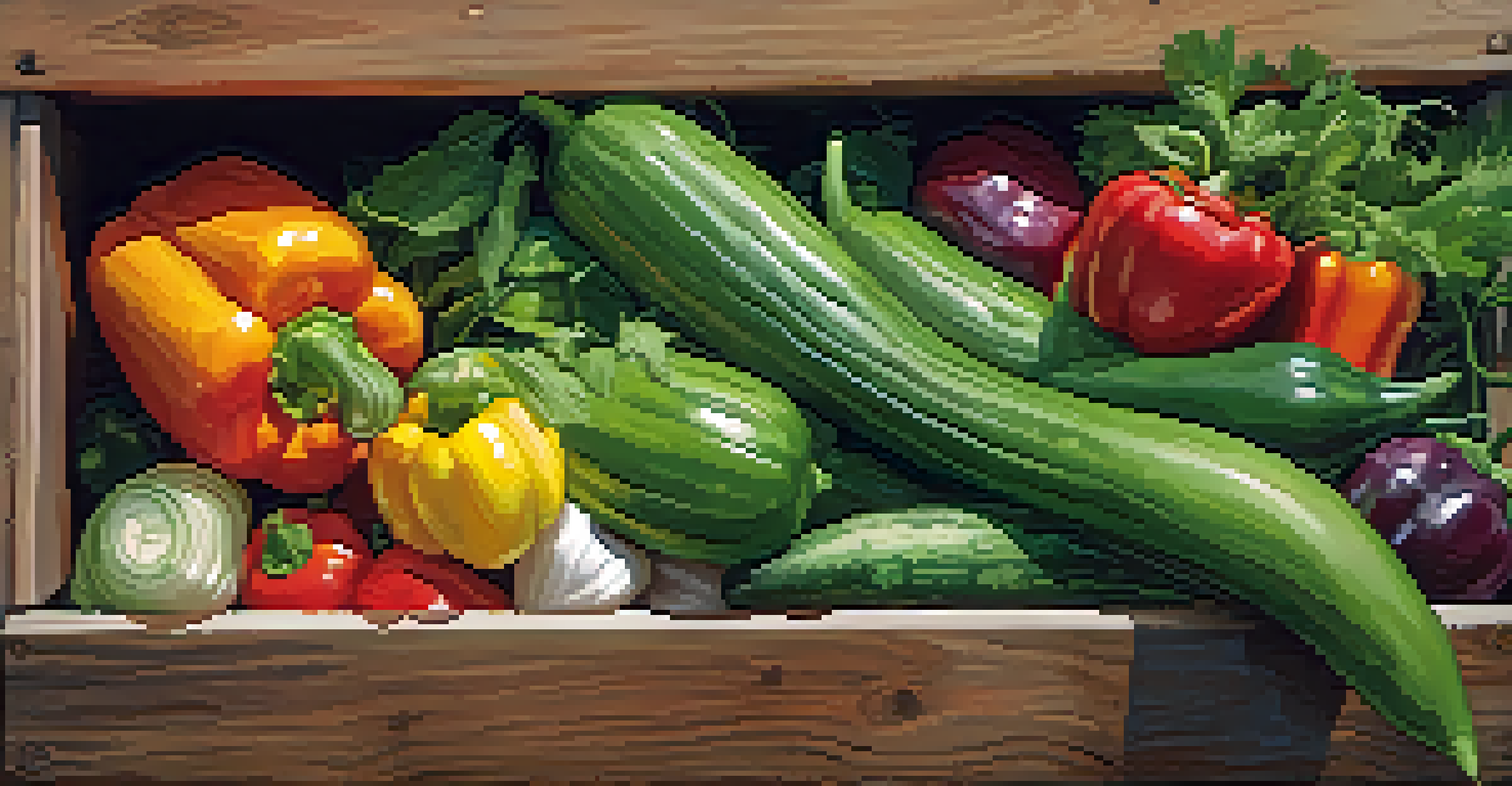Community Supported Agriculture: A Colorado Perspective

Understanding Community Supported Agriculture (CSA)
Community Supported Agriculture, or CSA, is a system that connects local farmers and consumers. It allows consumers to buy shares of a farm's harvest in advance, ensuring fresh produce directly from the source. This model not only supports local agriculture but also fosters a sense of community between the farmer and the consumer.
When we put the health of our community first, we all benefit from the fruits of our labor.
In Colorado, the CSA movement has gained significant traction, reflecting a growing interest in sustainable food practices. Many Coloradans are eager to know where their food comes from and support local economies. By participating in a CSA, members often receive a weekly box of seasonal produce, eggs, and sometimes even flowers.
This arrangement creates a unique bond between the community and farmers. It encourages transparency in food production and helps consumers appreciate the hard work that goes into farming. As members share in the risks and rewards of farming, they cultivate a deeper connection to their food.
The Growth of CSA in Colorado
Over the past decade, Colorado has seen a significant rise in CSA programs, with numerous farms across the state joining the movement. This growth can be attributed to the increasing awareness of health, environmental, and economic benefits associated with local food systems. The state's diverse climate allows for a variety of crops, making it a fertile ground for CSA programs.

Farmers markets and local food festivals have also played a crucial role in promoting CSA initiatives. Many people are drawn to the idea of nurturing local agriculture while enjoying fresh, organic produce. The sense of community fostered by these events encourages more consumers to consider joining a CSA.
CSAs Foster Local Food Connections
Community Supported Agriculture (CSA) creates a direct link between consumers and local farmers, promoting fresh produce and community engagement.
Additionally, the COVID-19 pandemic highlighted the importance of food security and local sourcing. Many Coloradans turned to CSAs for reliable access to fresh produce, further solidifying their place in the community. This shift has led to an even stronger demand for CSAs as a sustainable food source.
Benefits of Joining a CSA
Joining a CSA offers numerous benefits, both for consumers and farmers. For consumers, it means access to fresh, seasonal produce that is often organic and free from harmful chemicals. Eating locally not only supports your health but also reduces the carbon footprint associated with transporting food over long distances.
The best way to find yourself is to lose yourself in the service of others.
For farmers, CSAs provide a stable income stream early in the season, allowing them to plan and invest in their crops. This financial support reduces the uncertainty that comes with traditional farming methods. The relationship formed between farmers and members often leads to increased loyalty and community support.
Moreover, CSAs promote biodiversity and sustainable farming practices. By encouraging a diverse array of crops, farmers can better protect their land and its ecosystem. This commitment to sustainability resonates with many Coloradans who are passionate about preserving the environment.
Challenges Faced by CSA Farmers
While the CSA model has many advantages, it is not without its challenges. Farmers often face unpredictable weather conditions, pests, and diseases that can affect crop yields. These factors can make it difficult to meet the expectations of CSA members, leading to potential dissatisfaction.
Additionally, the upfront cost of joining a CSA can be a barrier for some consumers. While it ultimately saves money in the long run, the initial investment may seem daunting. Farmers must find ways to communicate the value of their offerings to encourage more people to participate.
Sustainable Practices Thrive in CSAs
Colorado CSAs prioritize sustainable farming methods, enhancing biodiversity and soil health while providing consumers with nutrient-rich food.
Logistics also pose a challenge, as farmers must coordinate distribution to ensure that members receive their shares on time. This requires careful planning and organization, especially during peak harvest seasons. Despite these hurdles, many farmers remain committed to the CSA model, understanding its long-term benefits.
Sustainable Practices in Colorado CSAs
Many Colorado CSAs prioritize sustainable farming practices, which are crucial for the health of the environment and the community. These practices include crop rotation, companion planting, and organic pest management. By employing these methods, farmers can maintain soil health and reduce their reliance on synthetic chemicals.
Some CSAs even take it a step further by implementing regenerative agriculture techniques. This approach focuses on restoring soil health and increasing biodiversity, which can lead to healthier crops and ecosystems. It's a win-win for both the environment and the consumers who benefit from nutrient-rich produce.
Moreover, CSAs often encourage members to engage with sustainable practices at home. They may provide tips on composting, gardening, and cooking with seasonal ingredients. This educational component helps foster a culture of sustainability that extends beyond the farm, creating a ripple effect in the community.
The Role of Technology in CSA
In today's digital age, technology plays a vital role in the success of CSAs. Many farms use online platforms to facilitate sign-ups, manage memberships, and communicate with consumers. This streamlining of processes not only makes it easier for farmers but also enhances the overall member experience.
Social media has also become an essential tool for CSAs to connect with their community. By sharing updates, recipes, and insights into farm life, they can build a loyal following. This transparency fosters trust and encourages more people to join and support their local CSA.
Technology Enhances CSA Experience
Modern technology, including online platforms and social media, streamlines CSA operations and cultivates stronger ties between farms and their members.
Additionally, some CSAs are exploring innovative solutions like mobile apps that allow members to customize their weekly shares. This level of personalization can enhance member satisfaction and encourage greater participation. As technology continues to evolve, it will undoubtedly play a significant role in shaping the future of CSAs.
How to Choose the Right CSA in Colorado
Choosing the right CSA can feel overwhelming, but a few key factors can help simplify the decision. First, consider the location of the farm and the convenience of pick-up or delivery options. Many CSAs offer various locations, making it easier for you to access your fresh produce.
Next, think about the type of produce you enjoy. Some CSAs focus on specific crops, while others offer a broader selection. Researching the farm's growing practices and visiting their website can provide valuable insights into what you can expect throughout the season.

Lastly, don't hesitate to reach out to the CSA for questions. Many farmers are more than happy to chat about their practices, share their philosophies, and even offer samples. By engaging with the farm, you can ensure a good fit and establish a connection with the source of your food.